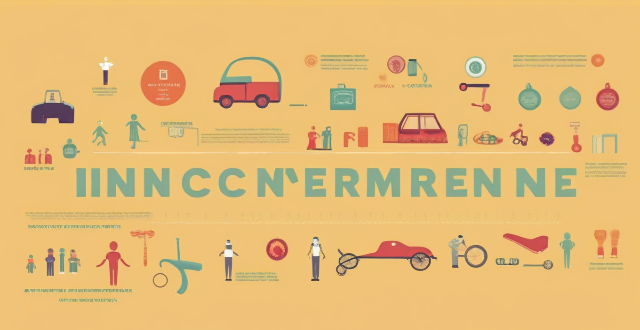Risk Insurance

How much does sports insurance cost ?
The cost of sports insurance varies based on the type of sport, level of coverage, and individual's age and health status. High-risk sports typically have higher premiums than lower-risk activities. Basic policies may only cover medical expenses and lost wages due to injury, while more comprehensive plans may include additional benefits such as disability coverage and accidental death and dismemberment insurance. Younger athletes may have lower premiums than older ones, and individuals with pre-existing medical conditions or a history of injuries may face higher premiums. Tips for finding the best sports insurance policy include shopping around, considering bundling, and asking about discounts.

What role does the insurance industry play in mitigating climate change ?
The insurance industry plays a crucial role in mitigating climate change through various mechanisms. They assess and price risks associated with climate change, providing financial incentives for mitigation, invest in sustainable projects, apply stricter underwriting criteria for high-emission industries, collaborate on research efforts, innovate insurance products, educate clients about climate risks, lobby for climate policies, and support reinsurance to share risks globally and back catastrophe bonds. By integrating climate considerations into their business models, insurers can drive progress toward a more sustainable future.

How do insurance mechanisms support disaster risk management and recovery processes ?
Insurance mechanisms play a vital role in supporting disaster risk management and recovery processes, providing financial protection to individuals, businesses, and governments against the economic impacts of natural disasters. They encourage risk mitigation measures, offer financial protection through various policies, facilitate recovery and reconstruction, invest in catastrophe modeling and research, and create public-private partnerships to improve disaster preparedness and response.

How can the insurance industry collaborate with governments and other stakeholders to address climate change ?
The article discusses the importance of collaboration between the insurance industry and governments to address climate change. It outlines five key areas where they can work together: risk assessment and modeling, development of climate-resilient infrastructure, insurance products and services for climate change, education and awareness campaigns, and investment in sustainable projects. By sharing data, improving risk assessment models, designing resilient infrastructure, offering insurance policies and consulting services, raising awareness through education campaigns, and investing in sustainable projects, these entities can mitigate the impact of climate change and adapt to its effects.

How does sports insurance work ?
Sports insurance is a specialized form of insurance that protects athletes and sports participants from financial losses due to injuries or accidents that may occur during physical activities. It provides coverage for medical expenses, lost wages, and other related costs associated with sports-related injuries. There are several types of sports insurance policies available, including personal accident insurance, liability insurance, equipment insurance, and travel insurance. Sports insurance typically covers a wide range of sports-related injuries and accidents, including medical expenses, disability, funeral costs, legal fees, equipment damage or theft, and travel expenses. The cost of sports insurance varies depending on several factors, including the type of sport, the level of risk involved, the policyholder's age and health status, and the amount of coverage desired.

Is sports insurance necessary for amateur athletes ?
This article explores the necessity of sports insurance for amateur athletes. It defines sports insurance as coverage against injuries sustained during sports activities, including medical expenses, lost income, rehabilitation costs, equipment damage, and liability coverage. The article highlights the risks and costs associated with sports injuries, noting that 62% occur during recreational activities rather than competitive events. It argues that sports insurance offers peace of mind, financial protection, and access to quality care for amateur athletes but may not be necessary for all. Factors to consider when deciding whether to purchase sports insurance include risk level, personal finances, existing health insurance, and frequency of participation.

How does credit history influence insurance rates ?
The text discusses how credit history influences insurance rates. Insurers use credit history as a predictor of future claims and risk, with studies showing that individuals with poor credit histories are more likely to file claims and cost insurers more money than those with good credit histories. Several factors can affect insurance rates based on credit history, including payment history, amount owed, length of credit history, and types of credit used. Maintaining a strong credit history can potentially save money on insurance premiums and demonstrate financial responsibility to insurers.

How does age affect the cost of insurance ?
The article discusses how age affects the cost of insurance, with younger drivers typically paying higher premiums than older drivers. It highlights that health insurance costs can increase as people age due to increased risk factors and the need for more frequent medical care. Life insurance rates may also rise with age, while auto insurance rates may decrease for retired drivers who spend less time on the road. Homeowners insurance costs depend on the condition and value of the home, but older homes may require more maintenance and repairs. The article provides tips for managing insurance costs as you age, including reviewing coverage regularly, maintaining a good driving record, staying healthy, and considering long-term care insurance.

What kinds of questions should I expect during the insurance application process ?
When applying for insurance, you will be asked a variety of questions to assess your risk level and determine the appropriate coverage and premiums. These questions cover personal information, employment details, health history, lifestyle habits, driving record, insurance history, financial information, beneficiaries and dependents, and additional questions related to hobbies, travel plans, and pets. Honesty is crucial when answering these questions as providing false information can result in denied claims or policy cancellation. It's essential to review your application carefully before submitting it to ensure all information is accurate and complete.

Are pre-existing medical conditions covered by travel insurance ?
Travel insurance coverage for pre-existing medical conditions varies by policy and provider. Factors influencing coverage include the type of policy, deductibles and limits, waiting periods, and disclosure of information. Some policies offer limited or comprehensive coverage for these conditions, while others exclude them altogether. It is crucial to research different policies and consult with an insurance professional to find the best coverage for your individual needs.

Are there any exclusions or limitations to sports insurance coverage ?
Sports insurance is designed to protect athletes, coaches, and organizations from financial losses due to injuries, accidents, or other unforeseen events. However, there are certain exclusions and limitations that may apply, including pre-existing conditions, high-risk sports and activities, alcohol and drug use, deductibles and co-payments, policy limits, and time limits for filing claims. It is important to be aware of these factors when purchasing sports insurance to ensure adequate coverage for your needs.

Is there an age limit for buying travel insurance ?
Is there an age limit for buying travel insurance? Most providers do not impose any restrictions based on age, but some policies may have specific requirements or limitations regarding age. When purchasing travel insurance, consider factors such as coverage options, pre-existing medical conditions, adventure sports coverage, cost, and reputation.

How long before my trip should I buy travel insurance ?
Travel insurance is a crucial component of any trip, offering coverage for unexpected events such as medical emergencies, trip cancellations, and lost luggage. The best time to buy travel insurance depends on various factors, including the timing of your purchase, trip details, personal situation, and research. Timing matters when buying travel insurance. It's recommended to buy early for peace of mind, better pricing, and more options. However, waiting too long can increase the risk of forgetting, limit options, and create coverage gaps. Trip details such as destination, length of stay, and activities should also be considered. Personal situation factors like health status, financial protection, and travel companions' needs should also influence the timing of your purchase. Practical steps include researching policies, comparing online, reading reviews, consulting a broker, completing an online application, confirming details, and keeping records. Ideally, travel insurance should be purchased at least a few weeks before the trip to ensure adequate coverage and avoid last-minute stressors.

Is it worth buying travel insurance for domestic trips ?
The article discusses the importance of travel insurance for domestic trips. It suggests that while it may not always be necessary, it can provide an additional layer of protection and peace of mind, especially for those embarking on adventurous or expensive trips. The article provides a list of key points to consider when deciding whether to purchase travel insurance, including risk assessment, coverage details, cost analysis, personal circumstances, and peace of mind. It also lists the benefits of travel insurance for domestic trips, such as medical coverage, trip interruption/cancellation, baggage loss/theft, emergency evacuation, and accidental death and dismemberment. The article concludes by suggesting that the decision to buy travel insurance depends on various factors such as the nature of the journey, existing coverage, and personal preferences.

What happens if I get injured while playing sports and don't have insurance ?
Injuries are a common occurrence in sports, and they can range from minor to severe. When you get injured while playing sports, the first thing that comes to mind is seeking medical attention. However, what happens if you don't have insurance? This article will explore the consequences of not having insurance when you get injured while playing sports. If you get injured while playing sports and don't have insurance, you will be responsible for paying all the medical expenses out of pocket. This can include doctor visits, hospital stays, surgery, physical therapy, and medication. Depending on the severity of the injury, these expenses can add up quickly and become a financial burden. Without insurance, you may have limited access to healthcare providers. Some doctors and hospitals may refuse to treat patients without insurance or may require upfront payment for services rendered. This can delay treatment and potentially worsen your condition. If your injury occurs during a team sport or an organized event, there may be legal implications if you don't have insurance. The organizers or other players may hold you liable for any damages or injuries that occur during the game. This can result in lawsuits and legal fees. Not having insurance can also have long-term effects on your health and well-being. If you cannot afford proper medical care or physical therapy, your injury may not heal properly, leading to chronic pain or disability. This can impact your ability to work or participate in activities you enjoy. The best way to avoid these consequences is to get insurance coverage. There are various types of insurance policies available, including health insurance, accident insurance, and sports-specific insurance. Research and compare different policies to find one that meets your needs and budget. Another way to reduce the risk of injury is to participate in low-risk sports or activities. Choose sports that are less likely to cause severe injuries, such as swimming or cycling, instead of contact sports like football or rugby. Wearing protective gear can also help prevent injuries while playing sports. Make sure to wear appropriate gear such as helmets, pads, and mouthguards when participating in high-risk activities. If you do get injured while playing sports, seek medical attention promptly even if you don't have insurance. Some healthcare providers offer payment plans or sliding scale fees based on income, which can help alleviate some of the financial burden associated with receiving medical care. In conclusion, getting injured while playing sports without insurance can have serious consequences, including high medical expenses, limited access to healthcare, legal liability, and long-term effects on your health and well-being. To avoid these consequences, it is important to get insurance coverage, participate in low-risk sports, use protective gear, and seek medical attention promptly if needed.

Can I get sports insurance for my child who plays school sports ?
Sports insurance can provide coverage for athletes participating in organized sports, including school sports. Consider factors like age limit, type of sports, level of competition, and coverage details when selecting a policy. Cost, duration, additional benefits, and the application process are also important considerations. While sports insurance offers peace of mind and financial protection, it can be expensive and may have limitations. Evaluate your child's needs and consult with an insurance professional to make an informed decision.

What is private mortgage insurance (PMI) and do I need it ?
Private Mortgage Insurance (PMI) is a type of insurance that protects the lender, not the borrower, in case of default on a mortgage loan. It is typically required when a homebuyer makes a down payment of less than 20% of the home's purchase price. Whether you need PMI depends on factors such as your down payment, credit score, loan-to-value ratio, and type of loan. Consider the cost of PMI and alternatives before deciding to obtain it.

How does a home security system help reduce insurance premiums ?
Home security systems can significantly reduce the risk of burglaries, thefts, and other potential threats to your property and belongings. By installing a home security system, you can deter criminals, provide evidence in case of theft or damage, receive automatic alerts and responses in emergencies, and remotely monitor and control your property. These benefits can lead to lower insurance premiums over time. When selecting a home security system, consider factors such as coverage area, customization options, integration with other devices, and customer support and maintenance.

How does having a pre-existing condition impact my ability to buy insurance ?
The text discusses the impact of pre-existing conditions on insurance purchase, including eligibility, cost, waiting periods, exclusions and limitations. It also provides tips for buying insurance with a pre-existing condition such as researching options, disclosing relevant information, considering government-sponsored plans, and working with an insurance broker.

Is it worth purchasing additional riders or supplements to my basic insurance policy ?
The article discusses the decision of whether it is worth purchasing additional riders or supplements to a basic insurance policy. It explains that these optional coverages provide protection for specific risks not covered by the basic policy, such as flood damage or liability concerns. The article highlights situations where purchasing additional riders may be beneficial, including living in high-risk areas, owning valuable assets, or having significant liability concerns. It also lists the pros and cons of adding riders, emphasizing enhanced coverage, customization, and cost-effectiveness but also highlighting increased costs, potential overlapping coverage, and complexity. The conclusion suggests that the decision should be based on individual needs and circumstances, with consultation with an insurance agent being recommended to determine the best fit.

What is the difference between term life insurance and whole life insurance ?
Difference between term life insurance and whole life insurance: - Term life insurance is temporary coverage, no cash value, renewable, and affordable. - Whole life insurance is permanent coverage, accumulates cash value, has level premiums, and is more expensive.

Can I extend my travel insurance coverage if I extend my trip ?
Topic: Extending Travel Insurance Coverage Summary: If you extend your trip, you may need to extend your travel insurance coverage. This depends on your policy's terms and the flexibility of your insurer. To extend coverage, contact your provider, provide details about your extended trip, pay an additional premium, and confirm the extension in writing. Consider timing, potential coverage changes, and alternatives if necessary.

How can I ensure that I'm getting the best price for my insurance ?
To ensure the best price for your insurance, shop around using comparison websites and direct insurers, consider brokers, increase your excess, pay annually instead of monthly, improve security measures, build a no-claims bonus, review coverage regularly, take advantage of discounts, maintain good credit history, avoid small claims, and renew early. These steps can help you save money on insurance while still ensuring adequate coverage.

What role do insurers play in climate risk management ?
Insurers play a crucial role in climate risk management by providing financial protection against losses and damages caused by climate-related events. They help manage exposure to climate risks through insurance policies, risk assessments, and risk transfer tools. Insurers contribute to climate risk management by assessing risks, offering insurance policies, utilizing risk transfer tools, investing in resilience and adaptation, collaborating with governments and stakeholders, raising awareness, and conducting research and development.

What is the process of buying insurance online like ?
The text provides a detailed guide on how to buy insurance online. It outlines the process in eight steps: researching and identifying needs, selecting an insurance provider, getting a quote, reviewing policy details, completing documentation, making payment and receiving policy documents, confirmation and follow-up, and activating coverage. The benefits of buying insurance online include convenience, comparison, transparency, and speed. However, precautions such as ensuring security and legitimacy of the website, and fully understanding the policy terms should be taken.

Can I buy travel insurance for someone else, like my parents or children ?
The article discusses the possibility of buying travel insurance for someone else, such as family members. It highlights the importance of understanding the specific requirements and restrictions associated with this process. The text provides a step-by-step guide on how to purchase travel insurance for someone else, emphasizing the need to choose the right policy that fits the insured person's needs and provides adequate coverage for their trip.

Are there any tax benefits associated with buying certain types of insurance ?
The text discusses the tax benefits associated with buying various types of insurance, including health insurance, life insurance, disability insurance, long-term care insurance, and homeowner's insurance. The benefits include tax-deductible premiums and tax-free death benefits for certain policies. It is emphasized that consulting a tax professional or financial advisor is crucial to understand how these benefits apply to individual situations, as tax laws vary by country and can be complex.

How much life insurance do I need ?
Determining how much life insurance you need is a complex process that depends on your financial situation, income replacement needs, debts and final expenses, current coverage, and consultation with a professional. Assessing your financial needs, calculating income replacement needs, considering debts and final expenses, evaluating current coverage, and consulting with a professional are all important steps to ensure you have the right amount of life insurance coverage for your loved ones.

Can I purchase travel insurance after booking my trip ?
The article discusses the possibility of purchasing travel insurance after booking a trip. It emphasizes that buying travel insurance early provides more comprehensive coverage, peace of mind, and potentially better prices. To purchase travel insurance after booking, one should research different policies, contact their travel agent or insurance company, provide relevant information, read the policy details carefully, and keep documentation safe. The article concludes that buying travel insurance early is generally recommended for optimal coverage and peace of mind during travels.

What is sports insurance and why is it important ?
Sports insurance, also known as athletic or sports-related insurance, is a type of insurance that covers athletes and participants in physical activities from injuries or accidents. It includes coverage for medical expenses, lost wages, and other damages resulting from an injury or accident. Sports insurance is important because it provides protection against injuries, lost wages, liability, and offers peace of mind for athletes. It allows them to participate in their chosen sport without worrying about the financial implications of an injury or accident.